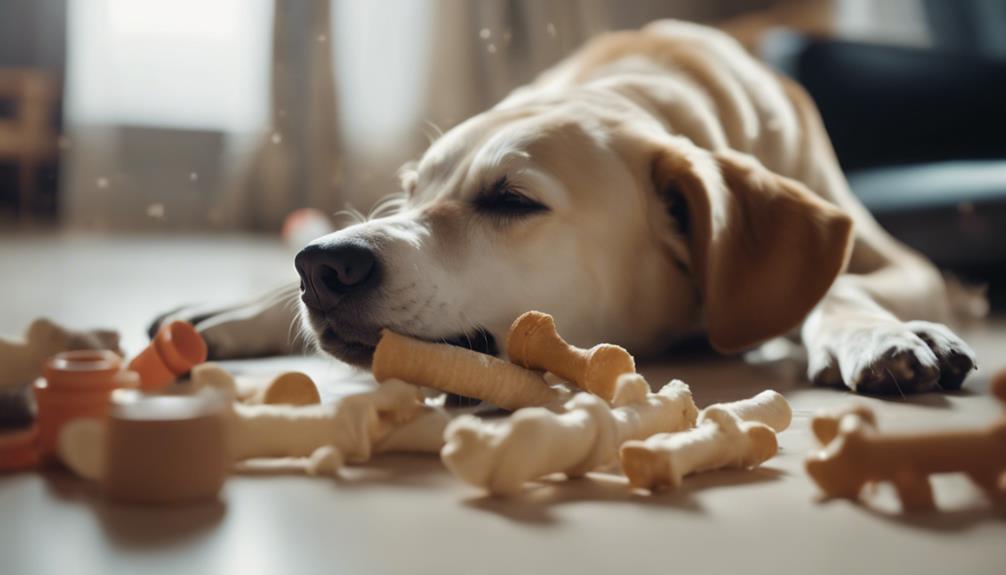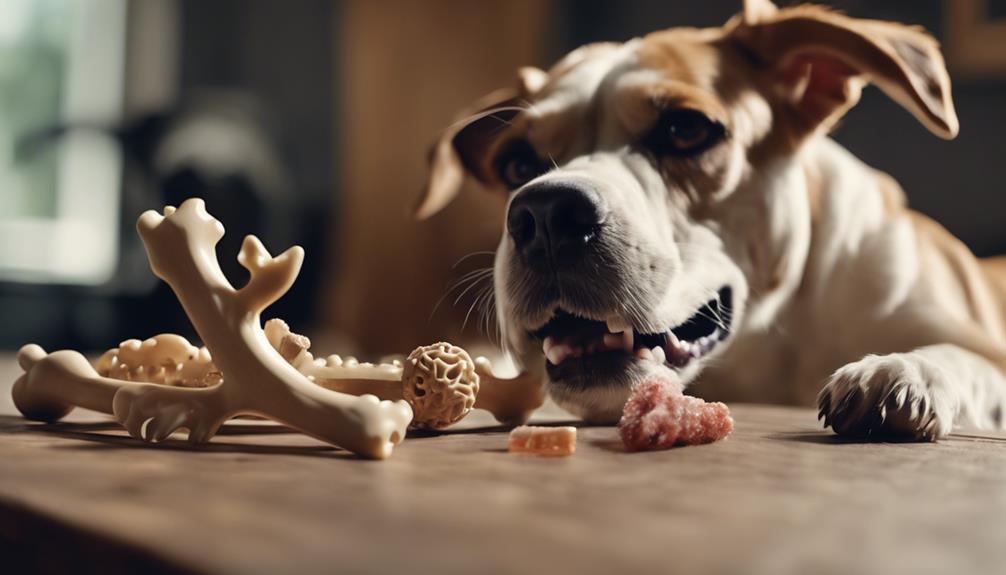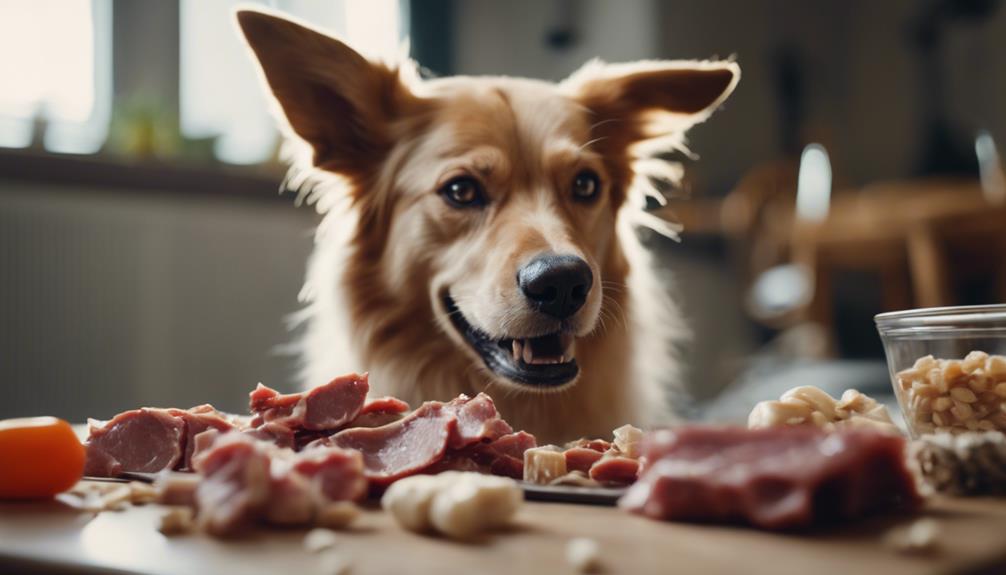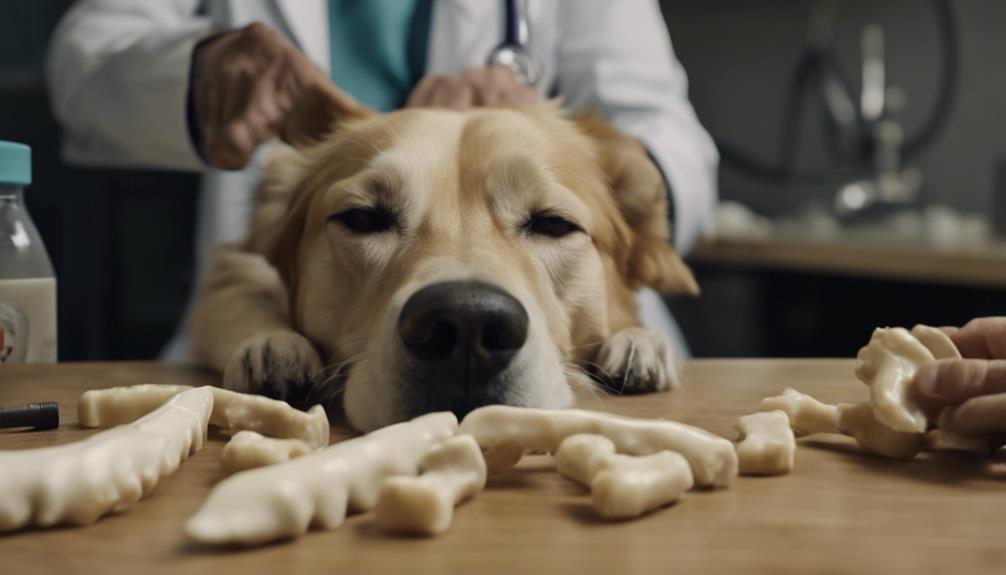When considering the suitability of rawhide chews for dogs, pet owners are often confronted with contrasting opinions on its impact. The debate surrounding the safety and benefits of this treat is multifaceted, warranting a closer examination of its effects on canine health.
By scrutinizing the potential risks, nutritional implications, and alternative options, individuals can make informed choices tailored to their pets' specific needs. Addressing the question of whether rawhide is detrimental or advantageous for dogs requires a nuanced understanding of the subject matter, prompting pet owners to delve deeper into their decision-making process to safeguard their furry companions' well-being.
Key Takeaways
- Rawhide may pose risks like choking and digestive issues.
- Feed dogs large rawhide pieces to prevent swallowing whole.
- Consider safer alternatives like KONG toys or egg yolk chews.
- Consult a vet for advice on rawhide or safe treat options.
Rawhide Chews Composition
Rawhide chews are typically composed of animal skins, predominantly sourced from cows, steers, and bulls, which are then fashioned into various shapes such as bones or strips. These treats are popular among dog owners due to their durability and the natural instinct of dogs to chew.
The process of creating rawhide involves cleaning the animal hide, cutting it into the desired shapes, and then drying it to create a tough texture that dogs can chew on for extended periods. While rawhide provides a source of protein and fat for dogs, it is essential to remember that it should be given in moderation as a supplemental treat rather than a primary component of their diet to avoid potential health risks.
Potential Risks of Rawhide Treats
While rawhide treats are favored for their durability and appeal to dogs' chewing instincts, it is crucial to be aware of the potential risks associated with their consumption. Some risks linked to rawhide treats include choking hazards, digestive obstructions, and concerns about digestion. To help you make an informed decision about giving rawhide to your pup, here is a table illustrating the potential risks:
| Potential Risks of Rawhide Treats |
|---|
| – Choking hazards |
| – Digestive obstructions |
| – Digestion concerns |
| – Allergic reactions |
Safety Tips for Rawhide Consumption

To ensure the safety of your dog during rawhide consumption, it is imperative to implement proper supervision and size-appropriate feeding practices. When offering rawhide treats to your furry friend, consider the following safety tips:
- Supervise Your Dog: Always monitor your dog while they are chewing on rawhide to prevent any potential choking hazards.
- Choose the Right Size: Select rawhide treats that are adequately sized for your dog to avoid swallowing large pieces.
- Limit Chewing Time: Do not allow your dog to chew on rawhide for extended periods to reduce the risk of digestive issues.
- Inspect Regularly: Check the condition of the rawhide treat regularly and discard it if it becomes small enough to swallow or poses a choking hazard.
When to Seek Veterinary Help
Concerns related to the safety of rawhide consumption may prompt dog owners to seek veterinary assistance promptly in specific situations.
If a dog exhibits signs of choking, such as difficulty breathing, pawing at the mouth, or excessive drooling after consuming rawhide, immediate veterinary attention is necessary.
Additionally, if the dog shows symptoms of digestive issues like vomiting, diarrhea, abdominal pain, or refusing to eat after ingesting rawhide, contacting a vet is advisable.
Any unusual behavior or distress following rawhide consumption should not be ignored, and pet owners should be prepared to seek professional help to ensure their dog's well-being.
Timely intervention and guidance from a veterinarian can help address any potential health risks associated with rawhide treats.
Exploring Rawhide Alternatives

Considering the potential risks associated with rawhide consumption, exploring alternative chew options for dogs is a prudent choice for conscientious pet owners.
When searching for safe and enjoyable alternatives to rawhide, pet owners can consider the following options:
- Nylon Chew Toys: Durable and long-lasting chew toys that are a safe option for aggressive chewers.
- Bully Sticks: Natural, digestible treats made from beef muscle that provide a satisfying chewing experience.
- Rubber Chew Toys: Interactive toys that can be filled with treats or peanut butter to keep dogs entertained.
- Deer Antlers: Long-lasting and natural chews that are a good option for dogs with strong chewing instincts.
Exploring these rawhide alternatives can help ensure your dog's chewing needs are met safely and effectively.
Dog-Friendly Nutritional Options
Exploring nutritious dietary options for dogs goes beyond rawhide alternatives to encompass a range of dog-friendly nutritional choices that promote overall health and well-being. When considering your dog's diet, opt for high-quality dog food that is rich in essential nutrients like protein, vitamins, and minerals.
Additionally, incorporating fresh fruits and vegetables such as blueberries, carrots, and sweet potatoes can provide added vitamins and antioxidants. Including lean meats like chicken or turkey can offer a good source of protein for muscle maintenance.
For dogs with dietary restrictions or allergies, there are hypoallergenic dog food options available. Consult with a veterinarian to determine the best nutritional plan tailored to your dog's specific needs for optimal health and vitality.
Importance of Balanced Diet

Maintaining a balanced diet is essential for dogs to support their overall health and well-being. Dogs, like humans, require a mix of nutrients to thrive and stay healthy.
Here are four key reasons why a balanced diet is crucial for your canine companion:
- Nutrient Intake: A balanced diet ensures that your dog receives all the necessary nutrients like proteins, fats, carbohydrates, vitamins, and minerals.
- Weight Management: Proper nutrition helps in managing your dog's weight, reducing the risk of obesity-related health issues.
- Energy Levels: The right balance of nutrients provides the energy needed for daily activities and overall vitality.
- Immune System Support: A well-rounded diet strengthens the immune system, helping your dog fight off illnesses and stay resilient.
Monitoring Digestive Health
Ensuring optimal digestive health in dogs is fundamental to their overall well-being and requires vigilant monitoring of their dietary intake and digestive functions.
Monitoring digestive health involves observing your dog's stool consistency, frequency of bowel movements, and any signs of gastrointestinal distress such as vomiting or diarrhea. Sudden changes in eating habits or appetite, along with excessive gas or bloating, can also indicate digestive issues.
Additionally, it is essential to pay attention to how your dog responds to different types of treats, including rawhide, as some dogs may have sensitivities or allergies that affect their digestion.
Regular Vet Check-ups

Regular veterinary check-ups are essential for monitoring and maintaining your dog's overall health and well-being.
- Preventive Care: Regular check-ups help detect any potential health issues early on, improving the chances of successful treatment.
- Vaccinations: Ensuring your dog is up to date on vaccinations is crucial for preventing common diseases and maintaining their immunity.
- Dental Health: Regular dental check-ups can prevent dental diseases such as periodontal issues, which can impact your dog's overall health.
- Nutritional Guidance: Vets can provide guidance on your dog's diet, helping you make informed decisions to support their health and well-being.
Food Considerations for Canine Health
For optimal canine health, careful consideration of dietary choices is paramount. A balanced and nutritious diet plays a crucial role in maintaining a dog's well-being. It is essential to provide dogs with high-quality food that meets their nutritional needs.
Certain vegetables like asparagus and pumpkin can be incorporated into their diet, offering additional vitamins and minerals. Diarrhea in puppies might indicate digestive problems, highlighting the importance of monitoring their food intake.
Regular vet check-ups are vital to assess a dog's overall health and ensure their dietary requirements are being met. Some foods can be harmful to dogs, potentially causing allergies or digestive issues, emphasizing the significance of selecting appropriate and safe food options for your canine companion.
Conclusion
In conclusion, the decision to offer rawhide chews to dogs should be made carefully, considering the potential risks and benefits associated with this treat. By understanding the composition of rawhide, implementing safety measures, and exploring alternative options, pet owners can prioritize their dogs' well-being.
Regular veterinary check-ups and a balanced diet are essential for monitoring digestive health and ensuring the overall health of canine companions. Making informed choices based on these considerations is crucial for responsible pet ownership.




